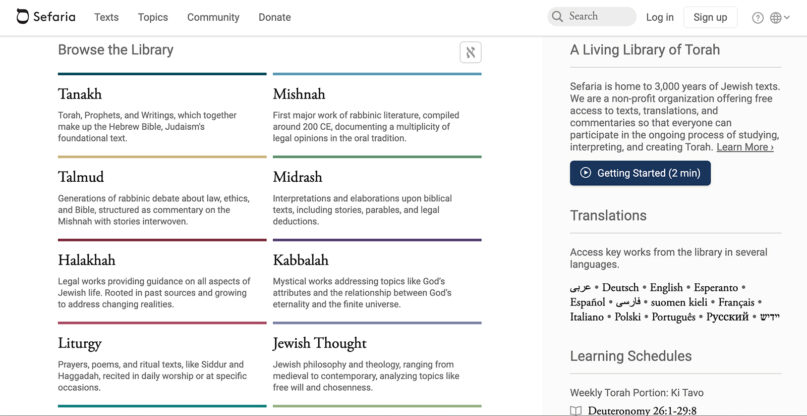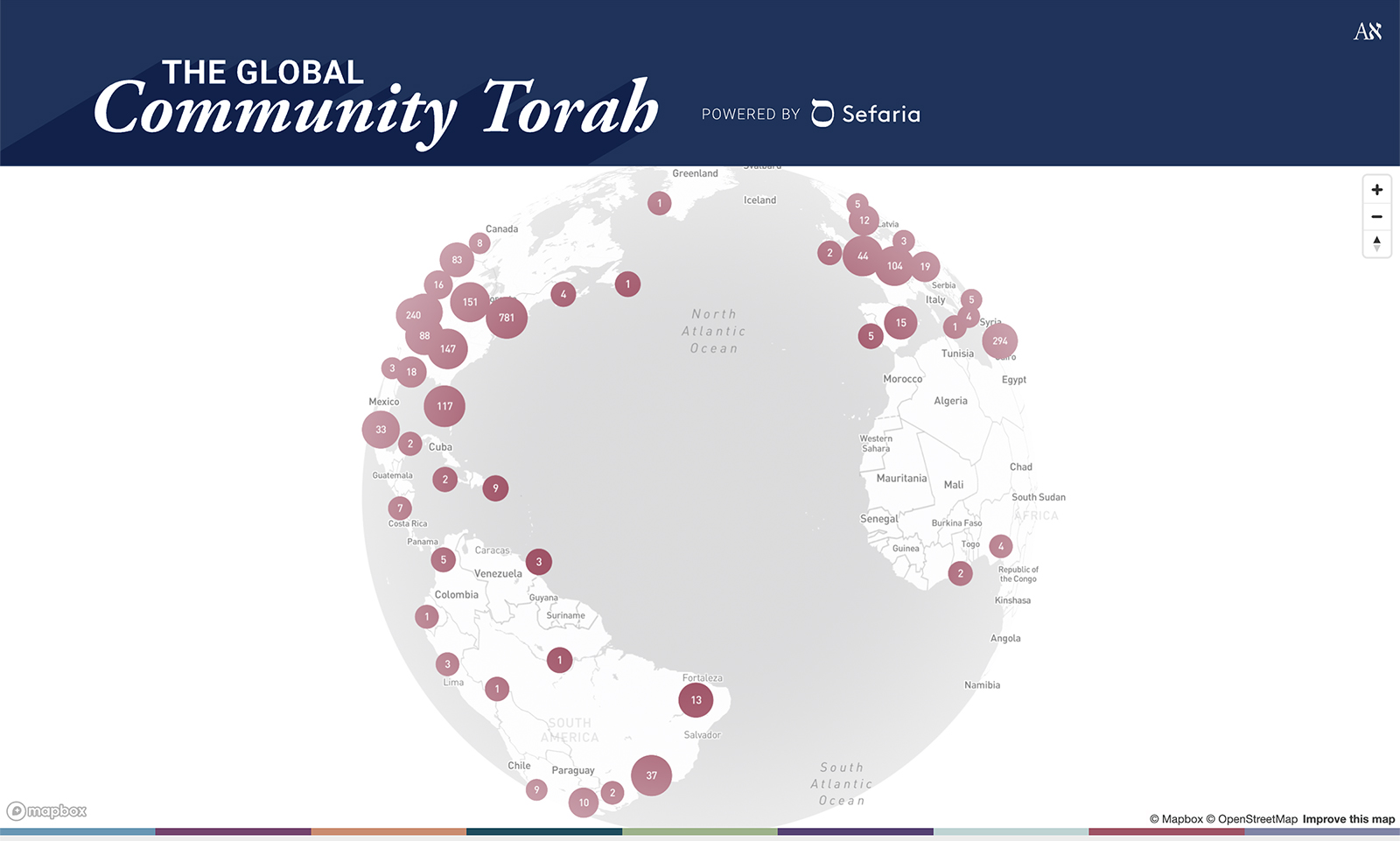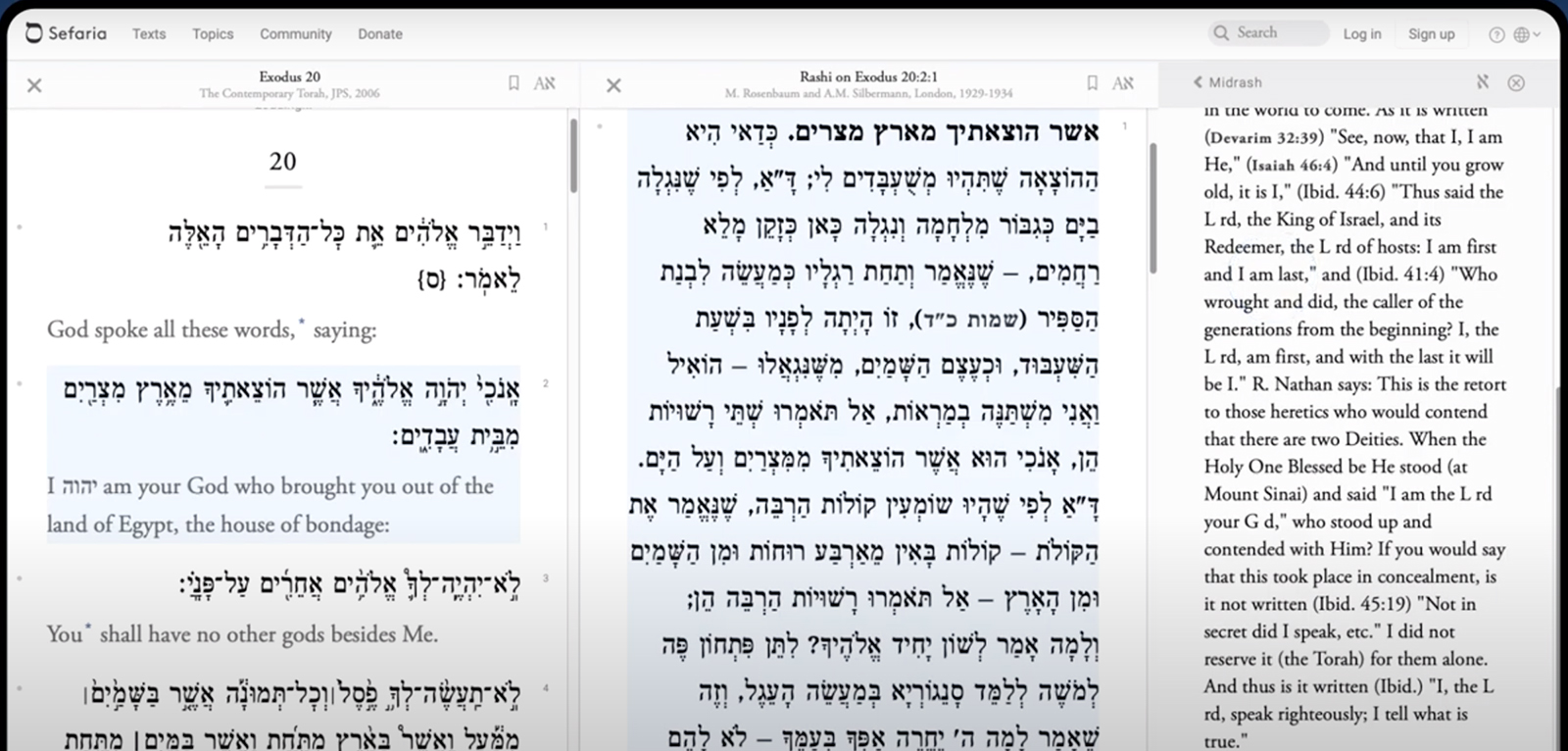A decade in, Jewish digital library has revolutionized learning for ‘people of the book’
Sefaria offers 3,300 Jewish canonical texts online for free.

(RNS) — Walk into any yeshiva classroom or rabbi’s study and you will find floor-to-ceiling bookshelves filled with the golden-lettered spines of traditional Jewish texts — compilations of ancient rabbinical teaching, theological treatises and Scripture.
But fewer Jews are reaching for those books these days as a 10-year-old database has digitized almost the entirety of the Jewish canon and many other theological writings — the contents of about 3,300 volumes in all.
The database Sefaria — the word comes from the Hebrew word “sefer,” or book — has revolutionized Jewish online learning, not least in its use among a wide spectrum of Jews around the world. It is not the only Jewish digital library, but it is the most widely used among Jews and is freely accessible, with some texts available in multiple languages.
For its 10th anniversary, which it celebrated earlier this month, Sefaria launched a digital collaboration called the “Global Community Torah,” in which readers can take a small part in “writing” a digital Torah scroll by contributing to one of the Torah’s 304,805 letters. Users first pick their preferred Hebrew typeface and then enter their name and location.
So far, 2,500 online users from 72 different countries have laid claim to one of 22 Hebrew letters and have collaboratively completed the first two chapters of Genesis.

Hovering over any of the letters will reveal the names of other participants. One three-letter Torah word, for example, was claimed by three people — one from Taiwan, another from Israel, the third from the United Kingdom.
“We aren’t really sure how long it will take to fill in the Torah,” said Chava Tzemach, Sefaria’s director of marketing and communications. “But we’re hoping to see some good progress over the next few months.”
Sefaria was founded in 2012 by author and entrepreneur Joshua Foer and Google alum Brett Lockspeiser. Back in 2011, Foer searched online for a version of the Talmud that he could read in English. The search yielded as its top result a pirated PDF copy of the multi-volume corpus of commentary on Jewish law, as well as an antisemitic website.
Foer called his friend Lockspeiser, who had just left Google. Over the course of a few conversations, the two began thinking, “Somebody should do something about this,” Foer recalled.
With help from several donors, including the Jim Joseph Foundation, they launched Sefaria in 2013. Their approach came not out of an Orthodox Jewish education but of their native world of digital technology. To make their site as widely accessible as possible, they released their code under an open source license.
In 2016, Sefaria rolled out its first mobile apps. The following year it launched a website for Israeli and Hebrew speakers. Today, Sefaria boasts 700,000 monthly users. Last year’s budget was close to $5 million.
Students of Judaism have applauded Sefaria for offering an in-book search function while also making it possible to search where a given biblical verse appears in other Jewish books. A “topics” page, meanwhile, allows searches of Jewish primary texts for terms like “abortion,” “gun-control” or “environmentalism.”
Educators, in particular, like Sefaria because they can build source sheets directly on the site, instead of cutting and pasting verses or paragraphs from different books and then trying to format it into one streamlined document.
“Once Sefaria came around and started offering source sheets, it was a game changer,” said Yosef Gillers, founder of Grow Torah, an organization that provides environmental Torah education programs for mostly Modern Orthodox day schools.
“From the validity and the verification of the text, to the sources, the fact that you can choose what translations you use — all of that is just unbelievable. No one else does anything like it,” Gillers said.

The Sefaria website. Screen grab
Sefaria has drawn some detractors, most recently in May, when it added a new translation of the Torah branded by the publisher, the Jewish Publication Society, as “gender-sensitive.” That riled some Orthodox rabbis who argued that removing male pronouns referring to God was not a neutral change.
“Every word or gender reference in the Torah is purposeful, and to disregard them and apparently assume that they do not matter stems from a troubling lack of knowledge,” wrote Rabbi Avrohom Gordimer, an Orthodox rabbi, in an Orthodox Jewish journal.
But for the most part, Sefaria’s clean and easy access to a vast array of Jewish texts makes it popular among all streams of Jewish life. Chabad, the Hasidic Orthodox movement, has its own digital library of major texts. A handful of others, mostly in Hebrew, exist, some requiring paid subscription, but Sefaria’s free, non-sectarian approach makes it the heavyweight of the digital realm. Indeed, some of the other sites were built using Sefaria’s data.
A scholar who works for Chabad told RNS he uses Sefaria, among other sources, but declined to give his name; he didn’t think his bosses would appreciate comments about a competing Jewish library.
The next area of growth for Sefaria, according to its creators, will include access to more modern texts that are not yet part of the public domain. In some cases, Sefaria will pay publishers to post them online.
“We want to make sure that Sefaria is a space that works for all Jews and everyone who wants to use it,” said Tzemach.
For Jews who have for centuries been known as “people of the book,” that’s a true revolution.
Jews Are Cheap | Ep. 2 | That's Racist:
https://youtu.be/2jXsL1ZF_o8?si=0RbsaHOOsfIwpOm-



Unfortunate that they went Woke. This article doesn't touch on every scandal & taint introduced by Sefaria.
ReplyDeleteInteressant that in this big legal mess involving multiple bungalow colonies, that are obviously populated by Satmar chevra, they went to Modern Orthodox Beis Din of America instead of a Satmar or other heimishe beis din.
ReplyDeleteSullivan Supreme Court
Index Number: E2022-2493
Case Name: Walkoff Holdings LLC vs. Waverly Homes Development LLC et al
In 3-5years or so, Rabbi AI will be saying the daf in Bavli/Yerushalmi with all the Rishonim. Sefaria, if used wisely is an important source. Think back to the days when every rebbe in yeshiva ketana used Jastrow and Soncino.
ReplyDelete